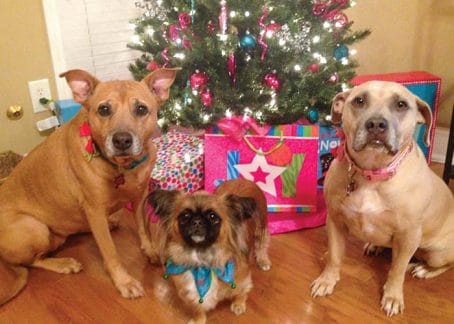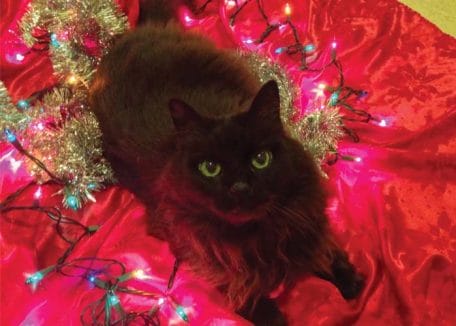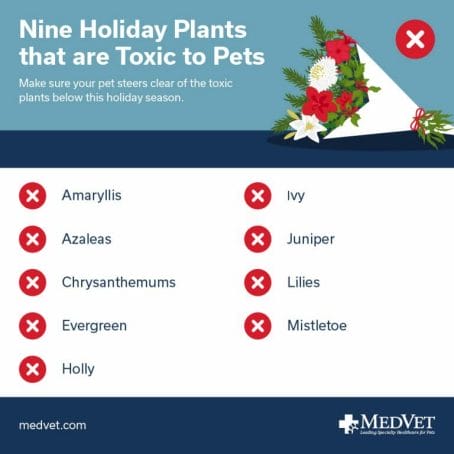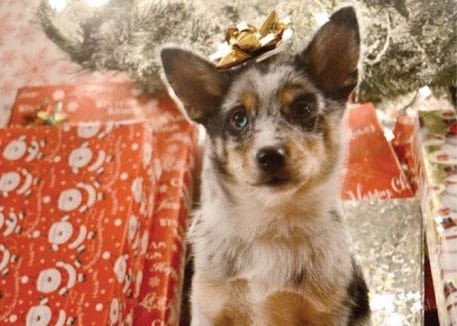Emergency Medicine, Urgent Care
Holiday Hazards for Pets: Keep Your Pet Safe this Season

The holidays are full of festive sights, sounds, and tastes. From glimmering and shimmering décor to tasty treats and holiday hustle, there’s a lot your pet can dig into during December. Follow these tips to help keep your pet away from hazards and the ER out of your holidays.
Holiday Lights
Holiday lights are beautiful and festive, but they can also be hazardous for pets who may be a little too interested in the new décor.
- Take care with cords. Chewing on cords can result in serious injuries such as electrical shock and oral burns. When decorating this season, take care to make cords less accessible by using cord organizers, tape, and electrical cord covers. You can also try using a bitter, pet-friendly cord spray to keep gnawing at a minimum.
- Protect pets from candles. Candles set a festive mood that can be disrupted by a curious pet should the candle be knocked over and start a fire. Pets can also get burned if they get too close. Smoke can also potentially irritate your pet’s respiratory system, especially if they have asthma or other respiratory issues. Try battery-operated, flameless candles as a safer alternative.

Trees and Trimmings
Besides the obvious danger (and hassle) of a tipped over tree, there are other potential hazards. Watch pets closely for the first few days and see how they are responding to your tree and trimmings. You might consider putting your tree in a room your pet doesn’t have regular access to or placing a safety gate around it.
- Ensure trees stay standing. Your pet, especially cats, may attempt to climb it or jump on it, and cats may try to use the trunk as a scratching post. These actions can cause the tree to fall and possibly result in an injury. Be sure to use a stable stand or consider bracing your tree by hooking it to the wall or ceiling.
- Keep pets away from the water. Evergreens contain harmful chemicals in the bark and sap, which can leech into the tree’s water supply. If you have a live tree, it’s important to change the water regularly and not let your pet drink from the stand. Laying a wire screen over the base can help keep your pet out of the water.
- Clean up evergreen needles. The oil on pine needles can irritate pets. Sharp needles can also puncture the digestive tract if swallowed, or they can lodge in the intestines and require surgery to remove. Make sure to regularly sweep up needles that have dropped to the floor.
- Take down the tinsel. It’s shiny, glittery, and stringy which makes it extra interesting to our feline friends. If ingested, tinsel can wrap around the base of the tongue and get caught in the intestines causing an intestinal blockage which can lead to emergency surgery.
- Check your ornaments. Glass ornaments can easily be knocked down and broken which can lead to cuts. Salt-dough ornaments (even once they’re dry) can seem tasty and tempting for pets, but too much salt causes can lead to dehydration or salt poisoning. Be mindful of where you hang decorations and keep breakable or dangerous ones out of your pet’s reach. Be especially careful with items that can be ingested and lodged in throats and digestive tracts.
Flowers and Plants
Despite popular belief, poinsettias are only mildly toxic to pets, and may not require medical attention unless clinical signs such as drooling, vomiting, and diarrhea are severe. However, many of the other festive flowers and plants we bring home for the holidays ARE dangerous to our furry friends. See our list of some of the chief offenders and either steer clear of bringing these flowers and plants into your home or ensure they are out of reach of your pets. Keep in mind that even non-toxic flowers can cause vomiting, choking, and diarrhea if too many are ingested.

Festive Foods
Many of us make food a big part of our festivities, but did you know many foods we enjoy can be dangerous to pets? If any of these foods are on your holiday menu, you’ll want to take extra care to keep them away from pets.
- Alcohol. Alcohol can be poisonous to pets and, in some cases, can lead to a coma or death. Even seemingly harmless amounts can be lethal. As little as one ounce of alcohol can kill a small cat or dog. Alcohol can also be found in some baked goods, like fruit cake, so keep those away from pets as well.
- Bones. Although it may seem natural to give your dog a bone, bones are a choking hazard, and they can splinter and cause an obstruction or laceration in the digestive system. If you’re going to give your dog a bone, make it a biscuit!
- Candy. Hard candies are choking hazards or can cause an obstruction. And sugar-free candy and gum often contain xylitol. When dogs ingest xylitol, it triggers the rapid release of insulin which can create a dramatic and dangerous drop in blood sugar.
- Chocolate. Chocolate contains fat, caffeine, and theobromine, which is the most toxic to pets. The darker the chocolate, the higher concentration of theobromine, and the more dangerous it is for your pet.
- Dough. Unbaked bread dough can be surprisingly appealing to pets, especially if it contains salt. Ingested yeast dough can rise inside a pet’s digestive tract, blocking or rupturing internal organs and potentially causing seizures and respiratory failure.
- Meats. Fatty meats and poultry skin can cause gastrointestinal issues. If your pet eats a lot, it can lead to pancreatitis. Even if you don’t share table scraps, some pets are known to table and counter surf, so remove plates when you’re done eating. Place trash in a secure area as well.
- Other ingredients. Even foods that aren’t the main star of the meal can cause an issue for your pet. For instance, onion can cause blood cell damage in dogs and cats. Macadamia nuts can be toxic and cause neurological issues such as seizures. And many holiday baked goods contain raisins; raisins and grapes can cause kidney failure in dogs.
Presents & Packaging
Not everything that makes a great gift for people is great for your pet. Whether under a tree or stuffed in a stocking, make sure gifts go to the intended recipient by following these tips.
- Store food gifts up and out of reach. Delicious treats are appreciated gifts, but most of these delicacies are not made for our pets, especially anything chocolate or items like sugar-free candy or gum. If you’re gifting treats of any kind, make sure to keep them off the floor and away from pets. Even once they’re wrapped, an enthusiastic pet can sniff them out and eat through the packaging when no one’s looking.
- Put toys away. Hard plastic toys are tempting for pets. But pets can break their teeth if they chew on them or can ingest small pieces which can cause an obstruction and lead to emergency surgery. Help your children put their toys away when they aren’t playing with them.
- Be on the lookout for batteries. Zinc in batteries can cause pancreatitis and renal damage. Batteries can be in children’s toys, cameras, watches, remote controls, and even greeting cards. It’s best to keep them boxed, in a drawer, or any other place your pet can’t access.
- Watch out for wrappings. Wrapping paper, ribbons, and bows make gifts look extra festive, but they’re also tempting for our pets. Some pets love to chew on them or play with them which can lead to ingestion. Supervise your pet while playing with bows and clean up wrappings right away.

Holiday Hustle and Bustle
Holidays can be stressful for you, and your pet. Ringing doorbells, extra visitors, and bustling activity can cause anxiety.
- Give pets their space. Try to keep your pet on a regular schedule if you can with normal feeding and exercise times. When visitors are coming over, give your pet a space of their own that is quiet and away from activity. Include their food, water, a comfortable spot to lay, and litter box (if needed.)
- Talk with your veterinarian. If your pet gets extra stressed or anxious from changes to their routine, speak with your vet about possible medications that could help.
- Keep pets out of guest bags. New people in your home can also mean new chances for a curious pet to explore their purses, bags, and packages. These can be filled with things that are not good for pets like medications, candy, or gum. Keep bags off the floor and out of reach.
- Make sure IDs are up to date. You may find your door is open more than usual with incoming guests and package deliveries, increasing the chance that your pet could dash out the door. Make sure your pet’s chip and identification is up to date just in case they become lost. And, whenever possible, put your pet in their safe place before you open the door.
Visit Your Vet if Needed
If your pet happens to dig into your décor or help themselves to festive foods, be sure to contact your veterinarian or visit your nearest MedVet emergency room or urgent care for help! For any items that your pet has ingested, it’s important to determine what it was and how much was ingested. If you can find original packaging, that can help your veterinary team provide the best care. Our emergency and urgent care locations are open throughout the holiday season to help.